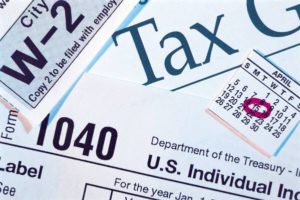 Today’s top story: The average 401(k) balance by age. Also in the news: Taking the next step with your student loans, 3 money tasks to do right now, and what to do with all the tax documents you’re receiving.
Today’s top story: The average 401(k) balance by age. Also in the news: Taking the next step with your student loans, 3 money tasks to do right now, and what to do with all the tax documents you’re receiving.
The Average 401(k) Balance by Age
How do you match up?
Take the Next Step With Your Student Loans in 2019
Setting small goals.
3 Money Tasks You Need to Do Right Now
Starting the year off right.
What to Do With All the Tax Documents You’re Getting Right Now
What to keep and what to toss.
 Today’s top story: Quick ways to save more money in 2019. Also in the news: Medical bills plague millennials, 3 simple strategies to max out your 401(k), and the basics of Parent PLUS loan forgiveness.
Today’s top story: Quick ways to save more money in 2019. Also in the news: Medical bills plague millennials, 3 simple strategies to max out your 401(k), and the basics of Parent PLUS loan forgiveness. Today’s top story: How to make the most of the Child Tax Credit this year. Also in the news: 4 reasons to ditch your old debit card, getting to know your 401(k) plan, and how to choose the best tax software.
Today’s top story: How to make the most of the Child Tax Credit this year. Also in the news: 4 reasons to ditch your old debit card, getting to know your 401(k) plan, and how to choose the best tax software. Today’s top story: 4 mental tricks to help you save more for retirement. Also in the news: How to boost your chances of getting a personal loan, answers to your HELOC questions, and how to get your finances in order before the new year.
Today’s top story: 4 mental tricks to help you save more for retirement. Also in the news: How to boost your chances of getting a personal loan, answers to your HELOC questions, and how to get your finances in order before the new year. Today’s top story: Do your kids a favor and pick retirement savings over tuition. Also in the news: 18 of the best Black Friday deals, Navient’s student loan practices are under fire, and how much it costs to have a float in the Macy’s Thanksgiving Day parade.
Today’s top story: Do your kids a favor and pick retirement savings over tuition. Also in the news: 18 of the best Black Friday deals, Navient’s student loan practices are under fire, and how much it costs to have a float in the Macy’s Thanksgiving Day parade.  Today’s top story: How today’s low taxes can nurture your nest egg. Also in the news: 4 questions to ask before you DIY, how a single mom masterminded a $700K swing from debt to savings, and how the new UltraFICO credit score will work.
Today’s top story: How today’s low taxes can nurture your nest egg. Also in the news: 4 questions to ask before you DIY, how a single mom masterminded a $700K swing from debt to savings, and how the new UltraFICO credit score will work. Today’s top story: Don’t let magical thinking jinx retirement. Also in the news: How to live with your first credit card’s low limit, legal complaint puts student debt relief companies in the crosshairs, and a decade after the housing crisis, foreclosures still haunt homeowners.
Today’s top story: Don’t let magical thinking jinx retirement. Also in the news: How to live with your first credit card’s low limit, legal complaint puts student debt relief companies in the crosshairs, and a decade after the housing crisis, foreclosures still haunt homeowners.